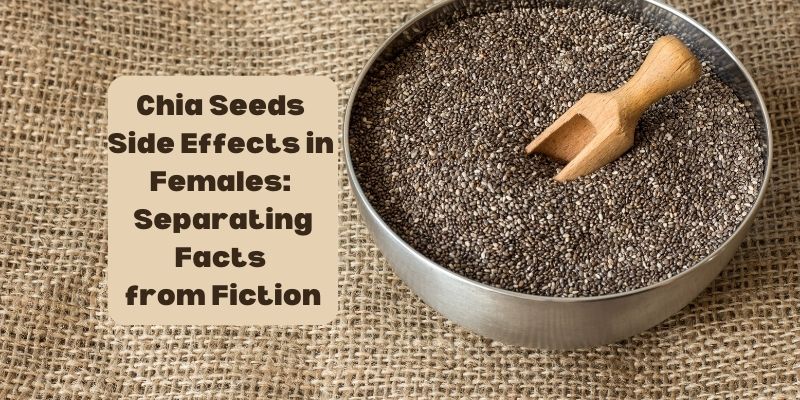Chia seeds, the tiny nutritional powerhouses, have gained widespread popularity in recent years due to their impressive health benefits. However, as with any superfood, it’s essential to consider potential side effects, especially for specific demographics like females. In this article, we will provide the world of chia seeds side effects in females, and explore the benefits that females should be aware of.
Chia Seeds: A Nutritional Marvel
Chia seeds, derived from the plant Salvia hispanica, have ancient origins and have been a staple in indigenous diets for centuries. Rich in essential nutrients, chia seeds boast a high content of omega-3 fatty acids, fiber, protein, antioxidants, and various vitamins and minerals. Their impressive nutrient profile has led to numerous health claims, including improved digestion, heart health, and weight management.
Read also:- Surprising Health Benefits of Ajwain
Chia Seeds Side Effects in Females: Common Concerns and Misconceptions
While chia seeds are generally well-tolerated and offer numerous health benefits, some females may experience certain side effects. It’s important to note that individual reactions can vary, and these side effects may not affect everyone. Here are some common side effects that females might experience when consuming chia seeds:
Digestive Discomfort
Chia seeds are high in dietary fiber, which can promote healthy digestion but may also cause digestive discomfort if consumed in excess or without sufficient hydration. Some females might experience bloating, gas, or abdominal discomfort.
Allergic Reactions
Although rare, some females may be allergic to chia seeds. Allergic reactions can manifest as skin rashes, itching, swelling, or difficulty breathing. Individuals with a history of seed allergies should exercise caution when introducing chia seeds into their diet.
Low Blood Pressure
Chia seeds’ omega-3 fatty acids may have a mild blood-thinning effect, which could potentially lower blood pressure. Females who are already on blood pressure medication or have low blood pressure should monitor their levels when incorporating chia seeds into their diet.
Medication Interactions
Chia seeds’ blood-thinning properties could interact with certain medications, such as blood thinners or anticoagulants. Females taking such medications should consult a healthcare professional before significantly increasing their chia seed intake.
Gastrointestinal Obstruction
In some cases, consuming large quantities of dry chia seeds without proper hydration can lead to a risk of gastrointestinal obstruction, as the seeds can absorb liquid and expand in the stomach.
Hormonal Effects
While chia seeds can support hormonal balance for many females, some individuals might experience hormonal fluctuations due to the seeds’ influence on hormone production. It’s advisable to monitor any changes in menstrual cycles or hormonal symptoms.
Caloric Intake
Chia seeds are energy-dense and can contribute to caloric intake. Overconsumption without accounting for these calories could potentially impact weight management goals.
Thyroid Function
Chia seeds contain goitrogens, compounds that can interfere with thyroid function in large amounts. Females with thyroid issues or those on thyroid medication should consume chia seeds in moderation.
Benefits for Females
Chia seeds offer several advantages that are particularly relevant to females:
Hormonal Balance: The omega-3 fatty acids present in chia seeds play a crucial role in maintaining hormonal balance, which is especially beneficial during menstrual cycles and menopause.
Bone Health: Chia seeds are an excellent source of calcium, magnesium, and phosphorus, promoting strong bones and helping prevent conditions like osteoporosis.
Weight Management: The soluble fiber in chia seeds expands in the stomach, creating a feeling of fullness and aiding in weight management, a benefit often sought after by many females.
Skin Health: Antioxidants found in chia seeds contribute to skin health, combating oxidative stress and potentially reducing signs of aging.
Conclusion
Chia seeds are a valuable addition to a balanced diet and offer a plethora of benefits for females. Their nutrient-rich composition can support hormonal balance, bone health, weight management, and skin vitality. While concerns about hormonal imbalances, digestive issues, allergies, and medication interactions have been raised, scientific evidence does not strongly support these claims. As with any food, moderation, and individual sensitivity should guide consumption.
Incorporating chia seeds into your diet can be a delightful and healthful experience. Remember, consulting with a healthcare provider before making significant dietary changes is always a prudent step. Embrace the nutritional goodness of chia seeds and savor the journey to enhanced well-being.
You may also like:
Best Time to Drink Chia Seeds for Weight Loss
FAQs
Q:- What are chia seeds, and why are they popular among females?
Ans:- Chia seeds are tiny seeds derived from the Salvia hispanica plant, known for their high nutritional content. They are popular among females due to their rich omega-3 fatty acids, fiber, and nutrient profile that offers benefits like hormonal balance, bone health, and weight management.
Q:- Can chia seeds cause digestive issues in females?
Ans:- Yes, consuming chia seeds in excess or without sufficient hydration can lead to digestive discomforts such as bloating and gas. Moderation and ensuring proper hydration can help mitigate these effects.
Q:- Are chia seeds safe for females with allergies?
Ans:- Chia seed allergies are rare, but individuals with a history of seed allergies should be cautious. Starting with small amounts and monitoring for allergic reactions is recommended.
Q:- Do chia seeds interact with medications commonly used by females?
Ans:- Chia seeds have mild blood-thinning properties due to their omega-3 fatty acids. Females on blood-thinning medications or anticoagulants should consult a healthcare professional before significantly increasing their chia seed consumption.
Q:- Can chia seeds affect hormonal balance in females?
Ans:- Chia seeds’ omega-3 fatty acids can support hormonal balance for many females. However, individual responses may vary, and some females might experience hormonal fluctuations. Monitoring any changes in menstrual cycles or hormonal symptoms is advisable.
